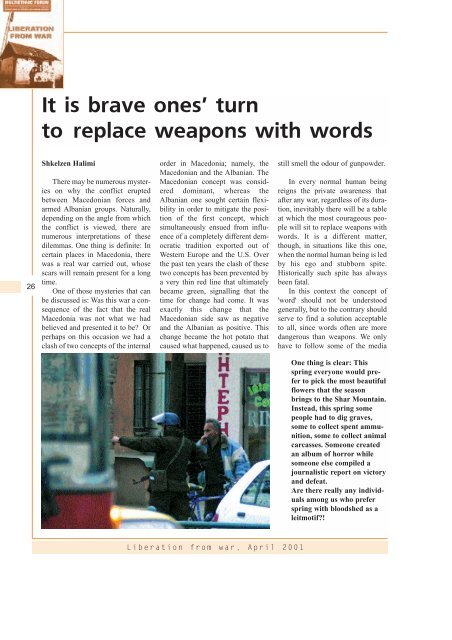Polyparty-ism - Search for Common Ground
Polyparty-ism - Search for Common Ground
Polyparty-ism - Search for Common Ground
Create successful ePaper yourself
Turn your PDF publications into a flip-book with our unique Google optimized e-Paper software.
It is brave ones’ turn<br />
to replace weapons with words<br />
26<br />
Shkelzen Halimi<br />
There may be numerous mysteries<br />
on why the conflict erupted<br />
between Macedonian <strong>for</strong>ces and<br />
armed Albanian groups. Naturally,<br />
depending on the angle from which<br />
the conflict is viewed, there are<br />
numerous interpretations of these<br />
dilemmas. One thing is definite: In<br />
certain places in Macedonia, there<br />
was a real war carried out, whose<br />
scars will remain present <strong>for</strong> a long<br />
time.<br />
One of those mysteries that can<br />
be discussed is: Was this war a consequence<br />
of the fact that the real<br />
Macedonia was not what we had<br />
believed and presented it to be? Or<br />
perhaps on this occasion we had a<br />
clash of two concepts of the internal<br />
order in Macedonia; namely, the<br />
Macedonian and the Albanian. The<br />
Macedonian concept was considered<br />
dominant, whereas the<br />
Albanian one sought certain flexibility<br />
in order to mitigate the position<br />
of the first concept, which<br />
simultaneously ensued from influence<br />
of a completely different democratic<br />
tradition exported out of<br />
Western Europe and the U.S. Over<br />
the past ten years the clash of these<br />
two concepts has been prevented by<br />
a very thin red line that ultimately<br />
became green, signalling that the<br />
time <strong>for</strong> change had come. It was<br />
exactly this change that the<br />
Macedonian side saw as negative<br />
and the Albanian as positive. This<br />
change became the hot potato that<br />
caused what happened, caused us to<br />
still smell the odour of gunpowder.<br />
In every normal human being<br />
reigns the private awareness that<br />
after any war, regardless of its duration,<br />
inevitably there will be a table<br />
at which the most courageous people<br />
will sit to replace weapons with<br />
words. It is a different matter,<br />
though, in situations like this one,<br />
when the normal human being is led<br />
by his ego and stubborn spite.<br />
Historically such spite has always<br />
been fatal.<br />
In this context the concept of<br />
'word' should not be understood<br />
generally, but to the contrary should<br />
serve to find a solution acceptable<br />
to all, since words often are more<br />
dangerous than weapons. We only<br />
have to follow some of the media<br />
One thing is clear: This<br />
spring everyone would prefer<br />
to pick the most beautiful<br />
flowers that the season<br />
brings to the Shar Mountain.<br />
Instead, this spring some<br />
people had to dig graves,<br />
some to collect spent ammunition,<br />
some to collect animal<br />
carcasses. Someone created<br />
an album of horror while<br />
someone else compiled a<br />
journalistic report on victory<br />
and defeat.<br />
Are there really any individuals<br />
among us who prefer<br />
spring with bloodshed as a<br />
leitmotif?!<br />
Liberation from war, April 2001

















